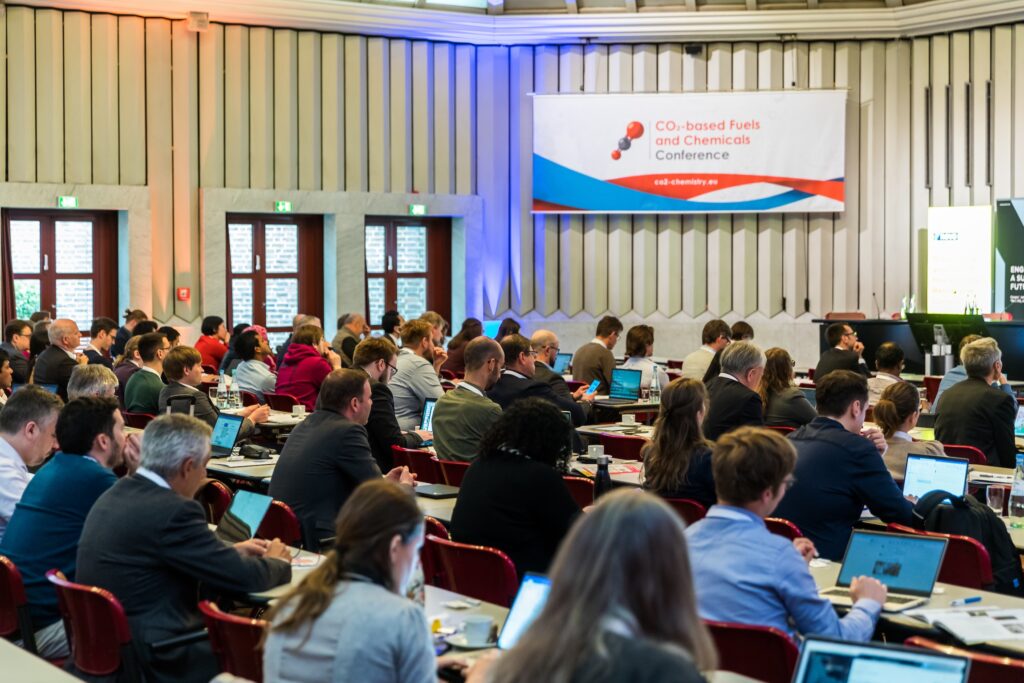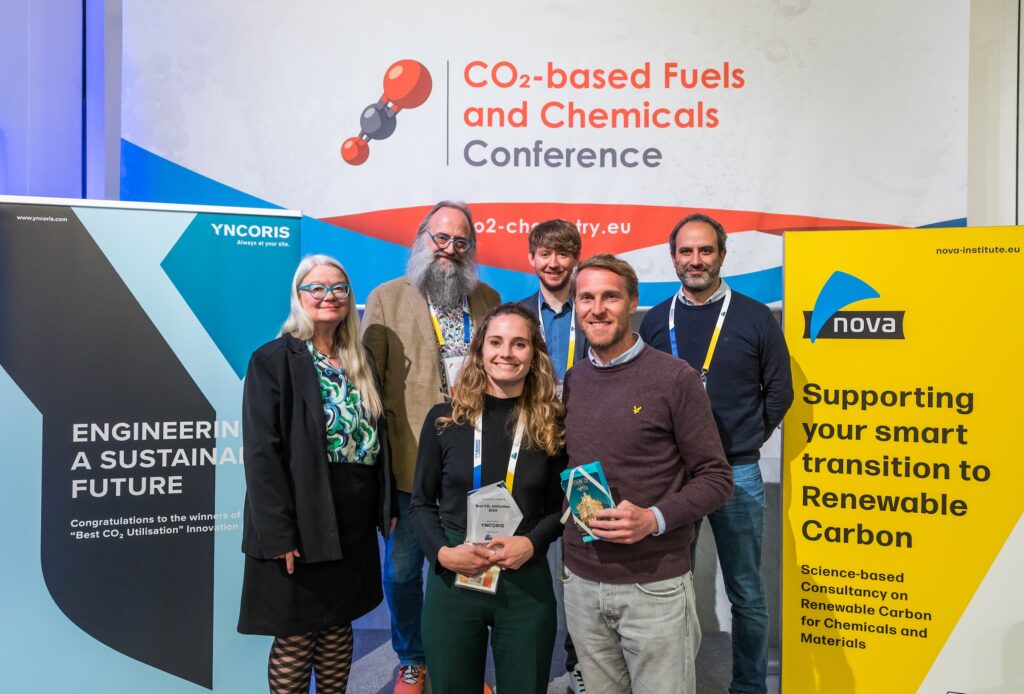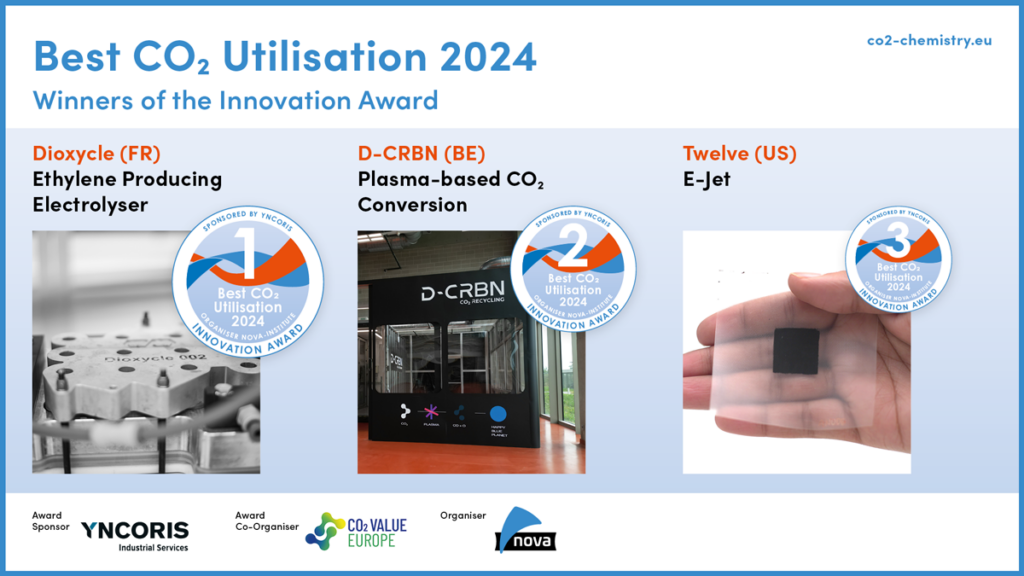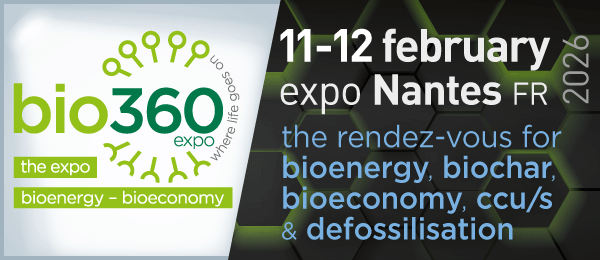230 participants from 27 countries worldwide joined the innovation award ceremony at the CO2-based Fuels and Chemicals Conference 2024 (www.co2-chemistry.eu) in Cologne, Germany, and online. Renowned as one of the premier global events for the entire CCU and Power-to-X industry and its stakeholders, this year’s 12th edition spotlighted the latest advancements in the rapidly expanding realm of carbon capture and utilisation.

Six nominees showcased their innovative CCU solutions to a diverse audience of global experts. Following this, a majority of the attendees participated in live voting to select the three winners of the “Best CO2 Utilisation 2024” innovation award.
From renewable ethylene to textile fibres and plastics to cutting edge plasma-based CO2 conversion and a synthetic sustainable aviation fuel (e-SAF) reducing lifecycle emissions, the three winning CCU solutions open the road to transition away from fossil resources.

The innovation award “Best CO2 Utilisation 2024” granted to Dioxycle
The innovation award “Best CO2 Utilisation 2024” has been granted to the French company Dioxycle for the development of an ethylene producing electrolyser. This remarkable carbon electrolysis technology transforms industrial emissions into sustainable ethylene solely utilising renewable electricity and water. As a result, Dioxycle’s technology is capable of generating carbon-neutral ethylene at a competitive cost compared to the fossil-based method, offering an economically appealing route to decarbonise numerous industrial and commercial sectors. Ethylene, being the most utilised organic chemical globally, is integral in various everyday products including textile fibers, plastics, and construction materials.
D-CRBN was awarded the second prize for a cutting-edge plasma-based CO2 conversion technology. The Belgian-based company developed a modular and scalable plasma technology capable of splitting the CO2 molecule into CO, all within a fully electrified, gaseous phase, devoid of solvents or catalysts. The CO is subsequently converted into high-value chemicals, including e-fuels, organic acids, polymers, etc., serving as essential feedstocks for industries such as chemical, petrochemical, maritime, and metallurgical sectors, among others.
Twelve, based in the US, won the third prize for its groundbreaking technology E-Jet® fuel. The technology produces Power-to-X sustainable aviation fuel (SAF) using just three components: water, renewable electricity, and CO2. This innovative fuel underwent testing and certification by the U.S. Air Force in 2021, demonstrating it is a drop-in solution in existing aircraft. Manufactured to ASTM D7566 specifications, the same stringent performance standard upheld by fossil-based jet fuel, E-Jet® fuel boasts up to 90 % lower lifecycle emissions, alongside reduced sulfur dioxide (SO2), nitrogen oxides (NOx), and other particulate emissions.

Sponsors and partners
The Innovation Award “Best CO2 Utilisation 2024” was sponsored by Yncoris, a service partner for the future-proof chemical industry, and it is co-organised by nova-Institute and CO2 Value Europe, the international association representing the CCU community in Europe and beyond. GIG Karasek supported the event as a sponsor.
The CO2-based Fuels and Chemicals Conference 2024 was held under the patronage of Mona Neubaur, Minister of Economic Affairs, Industry, Climate Action and Energy of the State of North Rhine-Westphalia and is supported by numerous industry and trade associations, non-profit organisations, research institutions and interest groups, that are thematically linked to the conference: BCNP Consultants (DE), BBE – Bundesverband Bioenergie (DE), C.A.R.M.E.N. e.V. (DE), ChemCologne (DE), Chemie-Cluster Bayern (DE), CLIB – Cluster Industrial Biotechnology (DE), CO2Value Europe (EU), Global CO2 Initative (International), IN4climate.NRW (DE), IBB – Industrielle Biotechnologie Bayern Netzwerk (DE), kunststoffland NRW (DE), Plastics Europe (DE), Renewable Carbon Initiative (International), VoltaChem (NL).
About nova-Institute
nova-Institut GmbH has been working in the field of sustainability since the mid-1990s and focuses today primarily on the topic of renewable carbon cycles (recycling, bioeconomy and CO2 utilisation/CCU).
As an independent research institute, nova supports in particular customers in chemical, plastics and materials industries with the transformation from fossil to renewable carbon from biomass, direct CO2 utilisation and recycling.
Both in the accompanying research of international innovation projects and in individual, scientifically based management consulting, a multidisciplinary team of scientists at nova deals with the entire range of topics from renewable raw materials, technologies and markets, economics, political framework conditions, life cycle assessments and sustainability to communication, target groups and strategy development.
50 experts from various disciplines are working together on the defossilisation of the industry and for a climate neutral future. More information at: nova-institute.eu – renewable-carbon.eu
Source
nova-Institute, press release, 2024-04-24.
Supplier
CO2 Value Europe
D-CRBN
Dioxycle
GIG Karasek GmbH
nova-Institut GmbH
Twelve (formerly OPUS12)
YNCORIS
Share
Renewable Carbon News – Daily Newsletter
Subscribe to our daily email newsletter – the world's leading newsletter on renewable materials and chemicals











